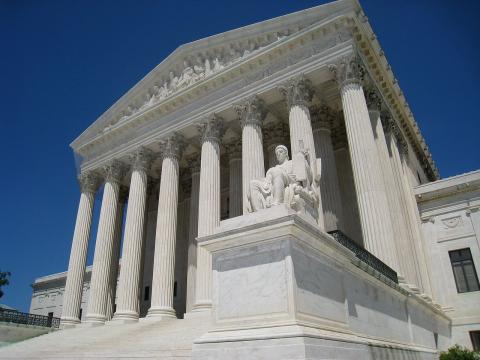Speaking of Supreme Court precedents...
From American Thinker, July 11, 2018 - On Birthright Citizenship
By Brian Lonergan
 MUCH OF WHAT THE AMERICAN PUBLIC HAS BEEN TOLD ABOUT BIRTHRIGHT CITIZENSHIP IS WRONG. The Immigration Reform Law Institute (IRLI) recently filed a friend-of-the-court brief in Fitisemanu v. United States, a case of birthright citizenship currently before the U.S. District Court for the District of Utah. [...] The brief examined the overarching matter of birthright citizenship. Namely, does the Fourteenth Amendment to the Constitution grant automatic citizenship to children born in the U.S. to parents who are not U.S. residents, or who are in the country without permission? The findings may well topple conventional wisdom about one of the crown jewels of the left's immigration agenda.
MUCH OF WHAT THE AMERICAN PUBLIC HAS BEEN TOLD ABOUT BIRTHRIGHT CITIZENSHIP IS WRONG. The Immigration Reform Law Institute (IRLI) recently filed a friend-of-the-court brief in Fitisemanu v. United States, a case of birthright citizenship currently before the U.S. District Court for the District of Utah. [...] The brief examined the overarching matter of birthright citizenship. Namely, does the Fourteenth Amendment to the Constitution grant automatic citizenship to children born in the U.S. to parents who are not U.S. residents, or who are in the country without permission? The findings may well topple conventional wisdom about one of the crown jewels of the left's immigration agenda.
For decades, many agencies have treated virtually all children born in the United States – even the children of illegal aliens or tourists – as citizens at birth under the Constitution. This all-inclusive interpretation of birthright citizenship, repeated endlessly in the mainstream media, is what gave rise to the "anchor baby" phenomenon. With children born in the United States to illegal alien parents instantly qualifying for welfare and other state and local benefit programs, the incentive for aliens to have their children born in the U.S. is immense.
Yet under Supreme Court precedent, neither the children of illegal aliens nor those of tourists are citizens at birth. In the 1898 case of United States v. Wong Kim Ark, the Supreme Court found that a man born in San Francisco to Chinese parents was a citizen at birth under the Fourteenth Amendment because his parents, when he was born, were legally residing in the United States. The holding of this case is widely misread as conferring citizenship at birth under the Fourteenth Amendment on all persons whatsoever born in the United States, with the narrow exceptions of children of diplomats, members of an invading force, and Indians born in the allegiance of a tribe. The brief shows that this reading is wrong; the Court clearly excluded the children of illegal aliens and non-U.S. residents from constitutional birthright citizenship. The Court's decision has been incorrectly applied for 120 years.
Based on Wong Kim Ark and an earlier decision in Wilkins v. Elk, the still controlling rule of the Supreme Court is clear: whether one is a citizen at birth under the Fourteenth Amendment depends on whether one was born in the United States to a U.S. resident parent who, at the time, both had permission to be in the United States and owed direct and immediate allegiance to the United States. This rule happens to exclude the children of both illegal aliens (who do not have permission to be in the country) and tourists (who do not "reside" here) from constitutional birthright citizenship.
To read the entire article, go to American Thinker.
Category
Immigration- 221 reads










Comments
Terms of Legal Residency
It would have been interesting to know exactly what the terms were for "legally residing" in the U.S. in 1898 regarding the Wong Kim case. Perhaps they were different from today? That would make a big difference.